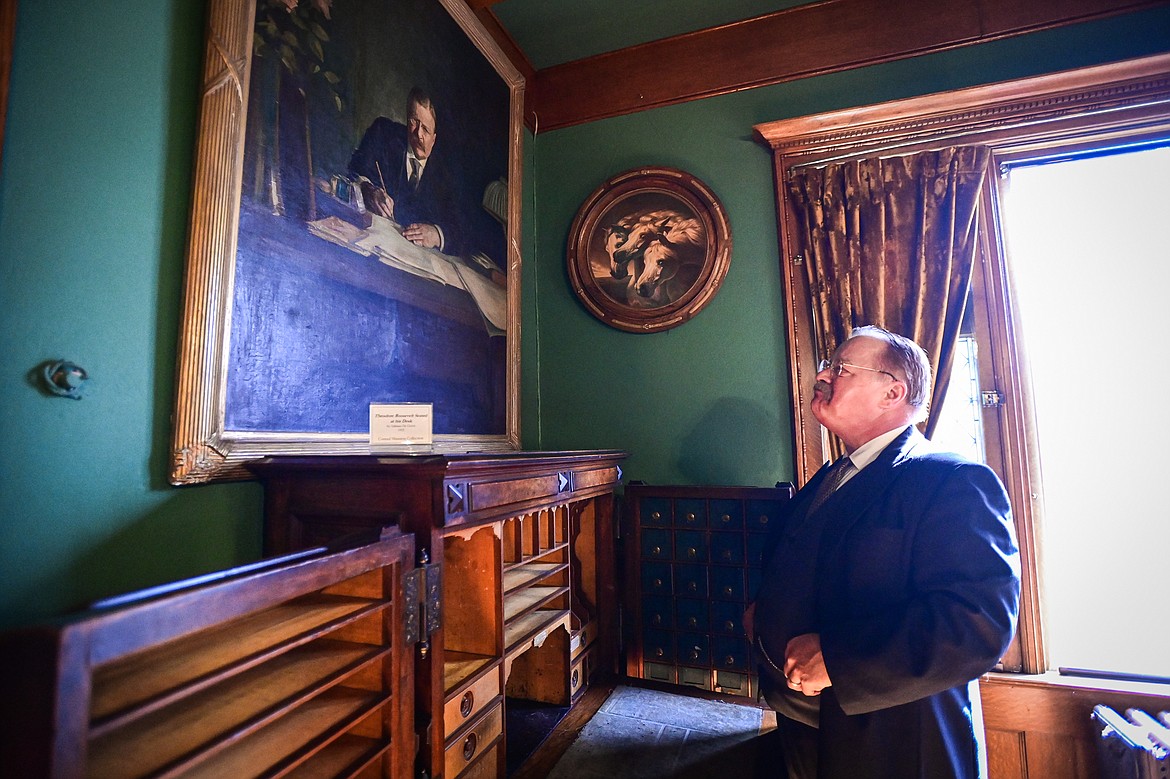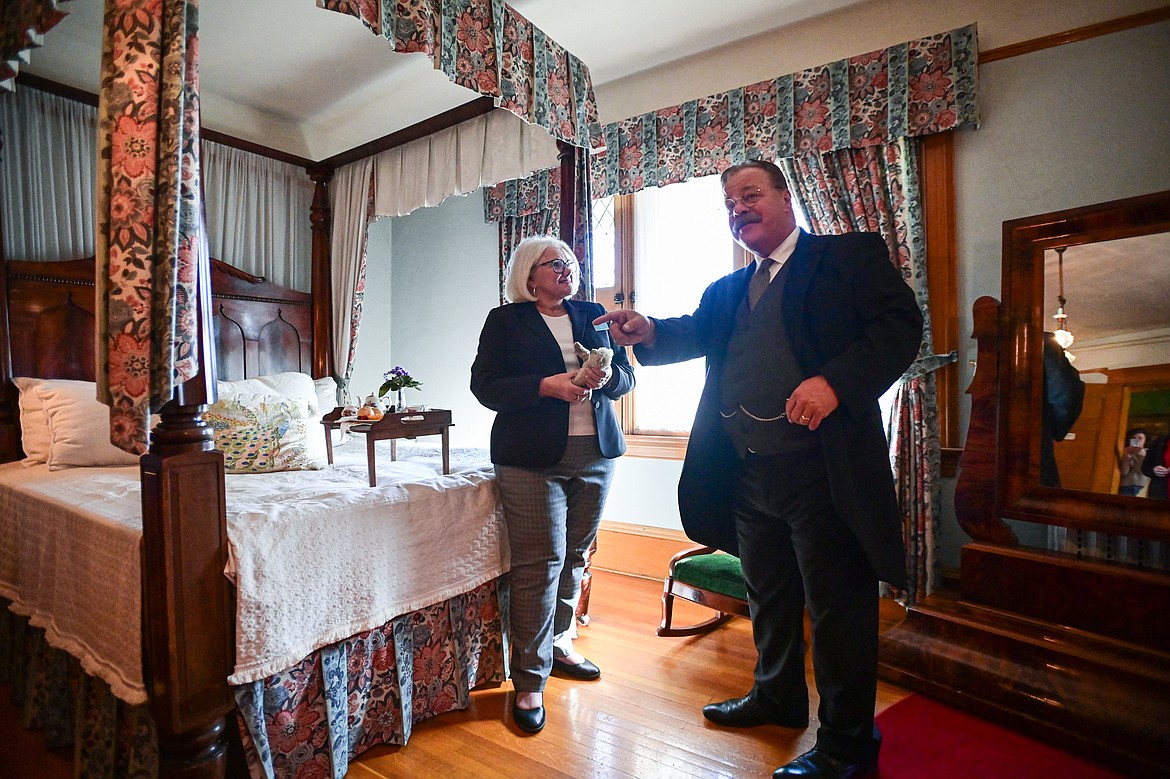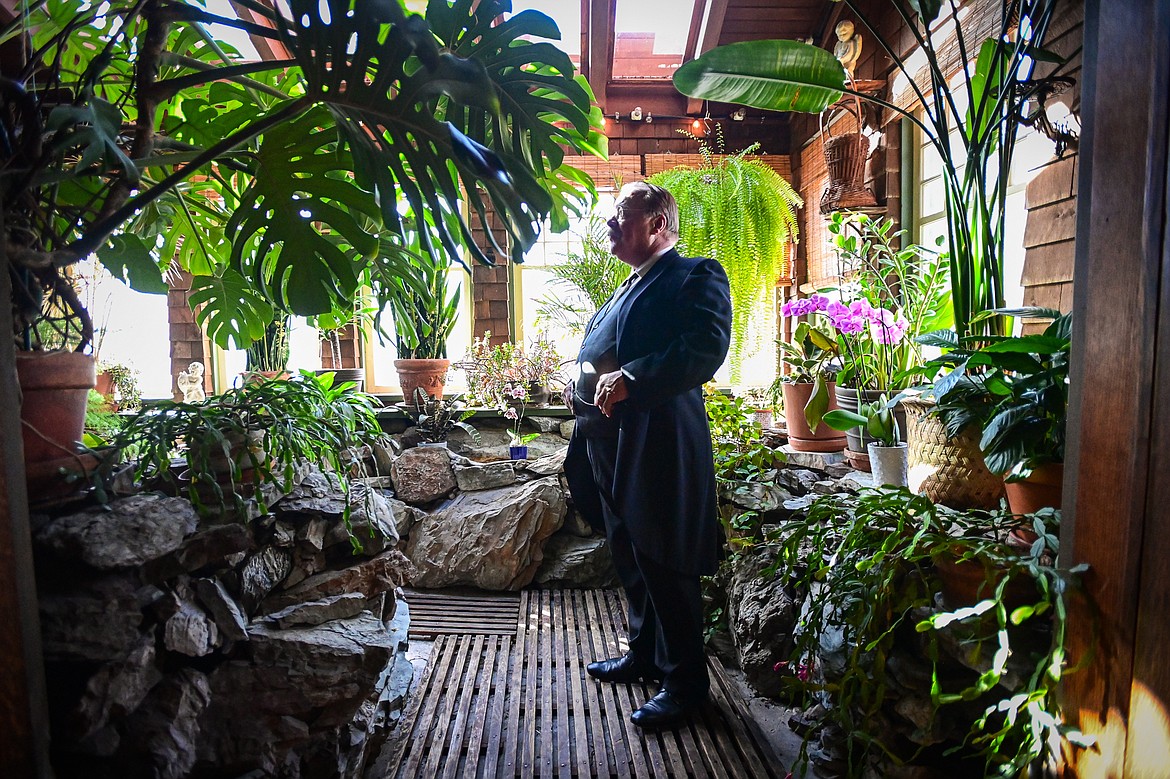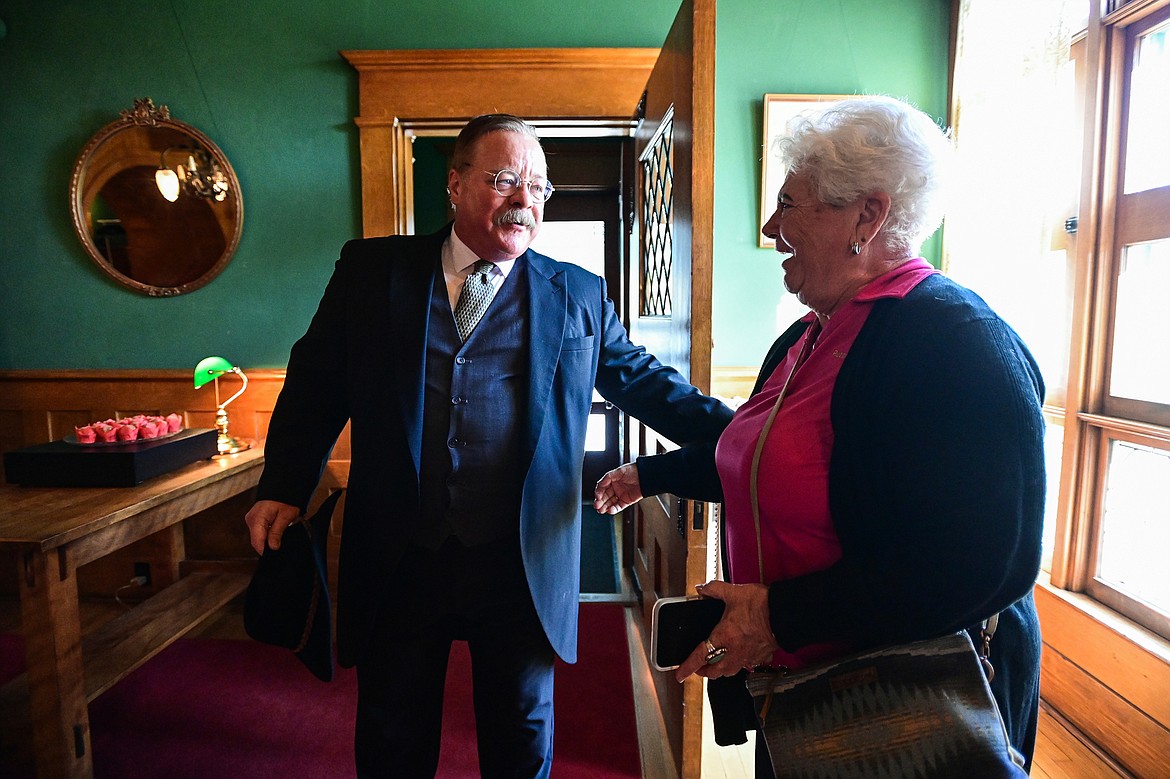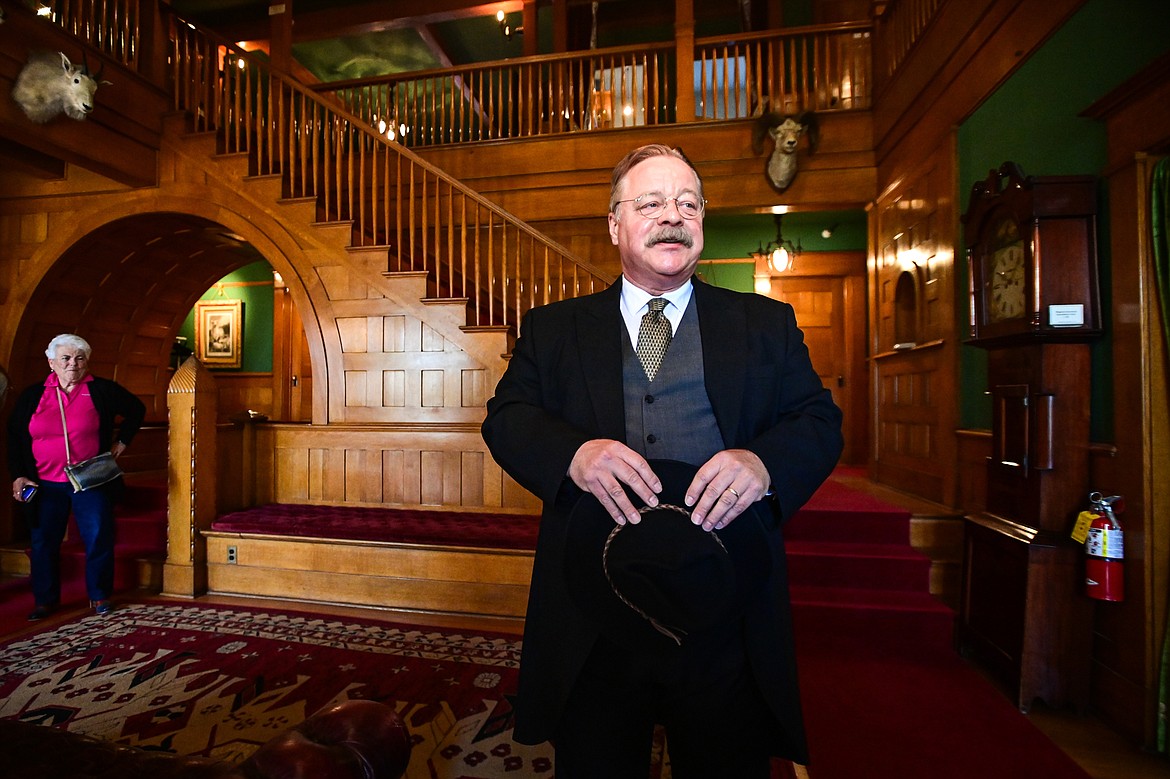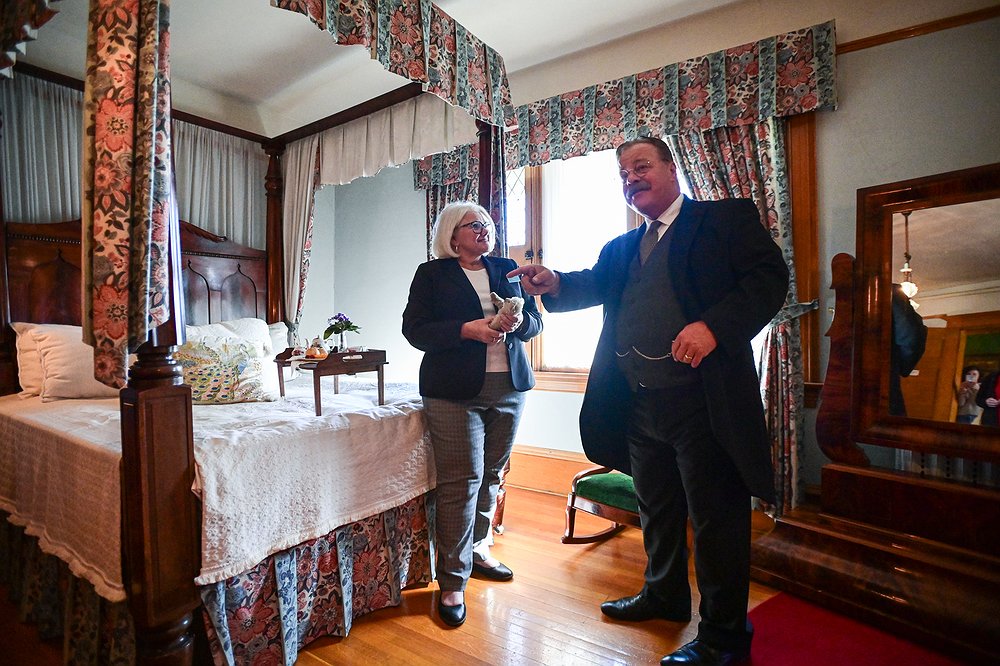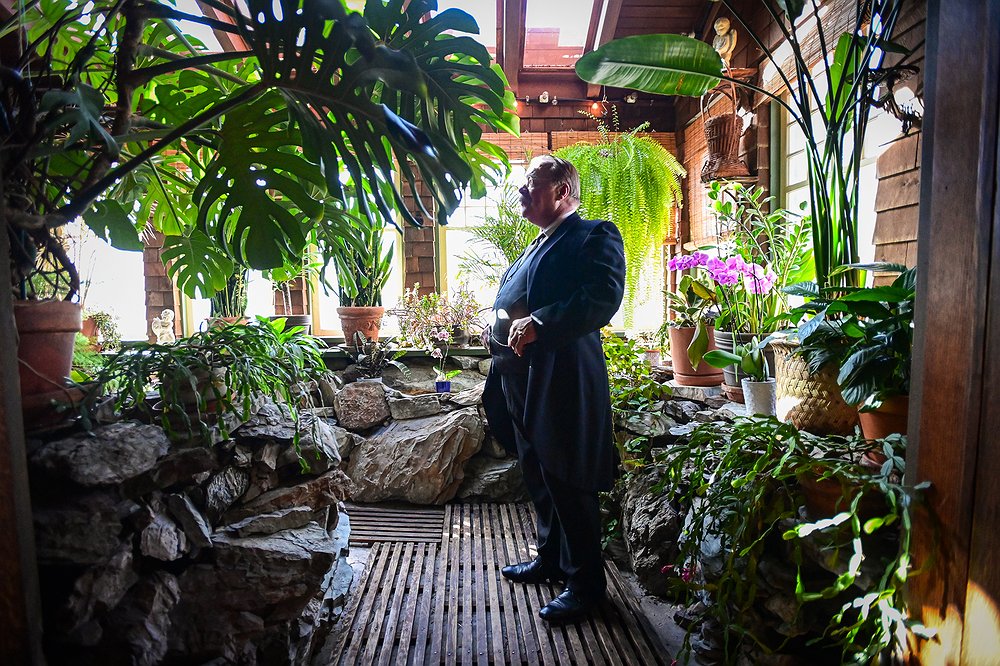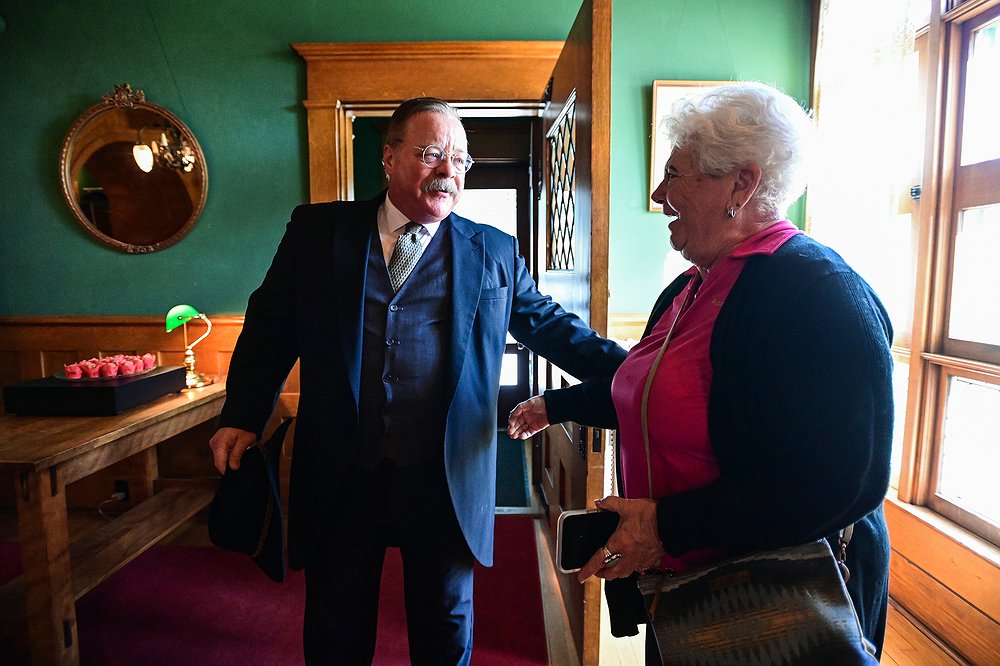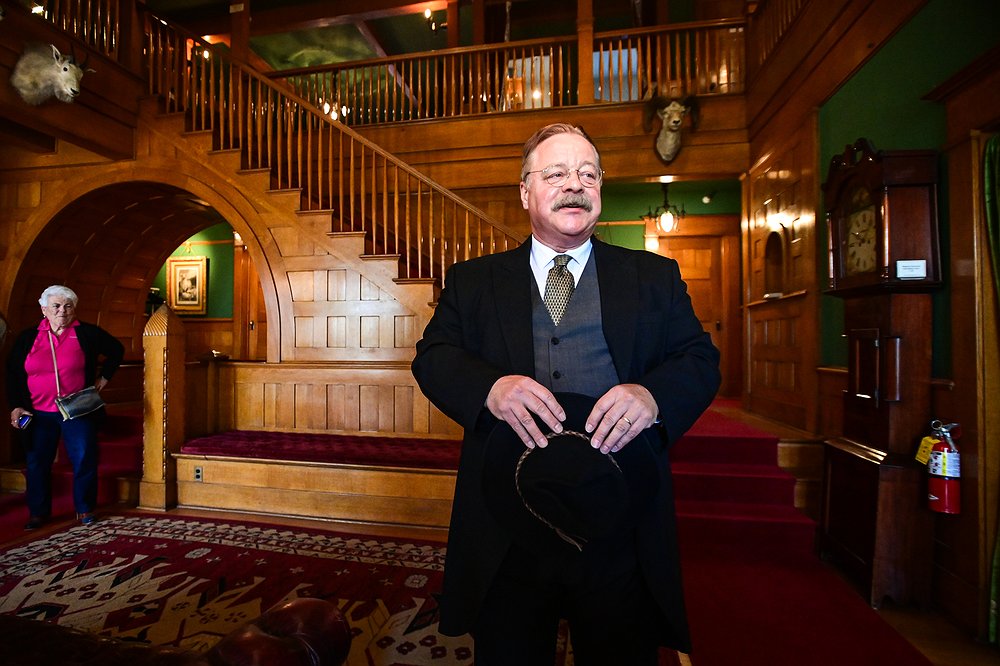Teddy Roosevelt pays a modern-day visit to Conrad Mansion Museum
More than a century after his last swing through Montana, former President Theodore Roosevelt bounded up the steps to the front entrance of The Conrad Mansion Museum in Kalispell on Wednesday.
Ever the politician, Roosevelt worked his way around the manse’s great hall, greeting museum employees, volunteers, a pair of journalists on hand for his visit, and members of the Evergreen and Kalispell Rotary clubs, and Kalispell Daybreak, who secured his trip to the Flathead Valley.
“You’ve got the grip of a Rough Rider,” he exclaimed upon shaking the hand of Laverne McIntyre of the Evergreen Rotary Club.
The Conrad Mansion served as the first stop for Roosevelt — ably portrayed by famed historical reenactor Joe Wiegand — in Northwest Montana during a trip that will see him deliver a full-length presentation at Flathead Valley Community College at 7:30 p.m. Thursday.
Arriving in a dark three-piece suit and hat, a mustachioed and bespectacled Roosevelt took in the imposing great hall while affixing a watch chain to his waistcoat.
“I love the home,” he declared, comparing it favorably to his Sagamore Hill residence in Oyster Bay, New York, now a historic site overseen by the National Park Service.
Though it is speculated that Roosevelt visited the home of Charles and Lettie Conrad, possibly during his 1912 presidential campaign atop the Progressive — or “Bull Moose” — Party ticket, tour guide Cindy Conner was happy to give him a refresher of the house’s amenities.
After instructing his fellow visitors to relax — “Please don’t stand on ceremony; my friends call me Colonel” — and inspecting the salon, Roosevelt followed Conner into the Conrads’ office only to be confronted by his own likeness hanging on the north wall in the form of Adriaan Martin De Groot’s 1922 painting “Theodore Roosevelt Seated At Desk.”
“You didn’t just put this up this morning for me?” Roosevelt roared. “You didn’t take Taft down? This isn’t a Wilson household, is it?”
IT WAS Woodrow Wilson who defeated both Roosevelt and then President William Howard Taft in the 1912 election that saw the former Rough Rider swing through Helena and Missoula while on the campaign trail.
While his visits to Montana are well-documented, including by the former president himself in “The Wilderness Hunter,” which regales readers with his trips to the Thompson Falls and Kootenai regions, a direct link to Kalispell is harder to confirm. In 2012, Lynnette Hintze, a former Daily Inter Lake editor, delved into the evidence local historians have compiled to make the case for Roosevelt’s having spent time in the valley and possibly visited the Conrad Mansion. Alicia Conrad Campbell, the youngest of Charles and Lettie’s children, was said to have recounted meeting Roosevelt over a meal to her close circle of friends.
Ahead of Roosevelt’s 2024 visit to the mansion, the museum fleshed out that possible connection by highlighting an interview Campbell gave author James Murphy for his book on Charles Conrad in 1970:
“So I could remember him best at dinner at the dinner table, and this is my early memory because this must have been important,” she told Murphy. “I had my food, my meals in the nursery, but I always came down in the high chair at my father's left side for dessert. I was very quiet and listened and got a lot of vivid memories that way. I felt a very great warmth of friendship for Roosevelt, but I expect he brought that out in everybody."
In another link to the valley, Roosevelt’s friend and former Rough Rider A. W. Merrifield established a home on the west shore of Flathead Lake around the turn of the century. It was Merrifield’s presence in Northwest Montana that brought Roosevelt to the region and it is thought that the Spanish-American War veteran hosted his New York friend on occasion.
Remnants of Roosevelt’s time in the region, at least as of Hintze’s 2012 article, existed in a pair of leather chaps trimmed with Buffalo hair. The pair, thought to have belonged to the former president, ended up in the Van Rinsum family of Flathead Valley.
Museum officials admit that linking Roosevelt and the Conrad Mansion is, at this point, speculation. No newspaper clippings documenting a possible visit have turned up and no letters or guest ledgers exist to prove a trip to the Woodland Avenue home.
IF HE had visited before, Roosevelt politely eschewed any mention of it while allowing Conner to point out the home’s details. Instead he inquired after Charles Conrad’s habits and temperament, noting another print of Kentucky statesman Henry Clay and remarking on the many taxidermied animals adorning the mansion.
In the dining room, he stood before a large cask protruding from the wall, flanked by a pair of steins hanging slightly above. Roosevelt took the opportunity to ask after Conrad’s eating and drinking habits, mentioning lightheartedly his stance on alcohol. Though supportive of the temperance movement that preceded Prohibition, he declared himself not a teetotaler, but abstinence-curious.
Pressed on what the cask would have held in Conrad’s time — wine or beer — Museum Director Brit Clark swung it open to show storage space inside.
“Neither,” she said with a smile.
A step into the nearby fernery nearly caused Roosevelt to reminisce about his adventures in the Amazon. In the kitchen, he noted the speaking tubes, recalling a similar set-up in Oyster Bay though they received infrequent use.
“There was a lot of hollering at Sagamore Hill,” he said, chuckling.
In the nearby ante room, he pressed his companions on who would lead the way to the second floor. When no takers presented themselves, he bellowed “Charge” and tramped up the staircase.
Shown the guest wing, Roosevelt pressed his hosts on where he might stay. In one of the rooms open for viewing, Conner led him to a roughly-loved teddy bear, which did prompt a retelling of his famous 1902 bear-hunting trip in Mississippi that led to the namesake stuffed toy.
At a stop in the family’s private quarters, Roosevelt pointed to a photo of George Campbell — Alicia Conrad Campbell’s husband — in uniform. Learning he was a pilot during World War I, Roosevelt inquired after his time in service and made a passing reference to his youngest son, Quentin, who was killed in combat in the skies of France in 1918.
Roosevelt paused to thank the museum’s team, members of the Rotary clubs and even the journalists in attendance at the conclusion of his tour.
“You all are doing good deeds,” he said. “Persist in the good deeds that you do here throughout the community.”
He broke character only once as he stepped out on his way to an event at the nearby Northwest Montana History Museum, turning back briefly to echo another famous American.
“I’ll be back. I know it was [Gen. Douglas] MacArthur, but I shall return,” he bellowed.
News Editor Derrick Perkins can be reached at 758-4430 or dperkins@dailyinterlake.com.

